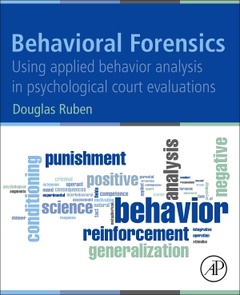Behavioral Forensics Using Applied Behavior Analysis in Psychological Court Evaluations
Auteur : Ruben Douglas

Behavioral Forensics: Using Applied Behavior Analysis in Psychological Court Evaluations presents the first compendia on the application of behavioral principles for the assessment and analysis of criminal behavior in court-ordered psychological evaluations. The book explains criminal motivation, risk behaviors, custody, criminal responsibility, and competence to stand trial. BFA employs principles and techniques of standard behavioral assessment in deducing causal evidence from interview and psychometric data. Sections cover evidence-based concepts and principles of BFA vs. obsolete forensic evaluation models, also including ten case studies that illustrate BFA in pre and post-sentencing evaluations that demonstrate how to determine risk of criminal recidivism or competency.
Considering the unprecedented numbers of psychologists turning to forensic work and influx of graduate programs offering degrees in criminal behavior analysis, this book is a timely resource for a variety of readers.
Section 1: Concepts of Behavioral Forensic Assessment1. What is Behavioral Forensic Assessment (BFA)? The role of Applied Behavior Analysis in Psychological Evaluation2. The paradigm shift from Traditional Models of Forensic Psychological Assessment to Behavioral Forensic Model
Section 2: Case Studies in Behavioral Forensic Assessment3. Behavioral Predictors of Sexual Proclivity in a Sexual Offender4. Misentitlement of Thrill-Seeking Sexual Assault in Individuals with Unregulated Urges (Motivating Operations)5. Intracontingency Variables in Criminal Responsibility Evaluations6. Risk of Alcohol Recidivism in Evaluating Reinstatement of a Driver’s License7. Behavioral Forensic Analysis of Competency-to-Stand Trial in the Evaluation of an Offender Accused of Car-Jacking and Breaking and Entering8. Social Contingencies Potentiating Vandalism and Violence9. Insularity Effects of Self-Reinforcement under Concurrent Variable Interval Punishment Schedules in the Assessment of Repeated Embezzlement10. Cultural Contingencies of Survival Intermingled with Domestic Violence: A case of Evocative Effects of Metaphorical Extension11. Contingencies of Vicarious Conditioning Resembling Munchausen by proxy in the Assessment of Parental Competence12. Intrafamily Contingencies Exposing Contradictory Testimony and Parental Incompetence in Two Parents Vying for Child Custody13. Avoidance/Escape (Operant) Conditioning and Respondent Biophysical Arousal in the Behavioral Forensic Assessment of an Adolescent Arsonist14. Effective Communication of Psychological Evaluation Findings for the Court
- Presents the advantages of using Behavioral Forensic Assessment (BFA) over personality theories
- Explains criminal motivation, risk behaviors, custody, criminal responsibility and competence to stand trial from a natural science (behavioral and interbehavioral) perspective
- Includes case studies that illustrate BFA in pre-sentencing and post-sentencing evaluations
- Offers the most scientific, evidence-based approach to criminal (forensic) psychological evaluations
Date de parution : 11-2019
Ouvrage de 320 p.
19x23.3 cm
Thème de Behavioral Forensics :
Mots-clés :
AAPL Practice Guideline; Actuarial model; Alcoholism; Applied behavior analysis; Applied behavioral analysis; Arson; Avoidance and escape behavior; B.F; Skinner; Battered woman syndrome; Criminal justice; Behavior segments; Behavioral assessment; Behavioral cusp; Behavioral forensic analysis; Behavioral forensic psychology; Behavioral principles; Bibliotherapy; Chemical castration; Childhood effects of punishment; Communication with public and social media; Competency to Stand Trial; Consequence properties; Criminal behavior; Criminal personality; Criminal responsibility; Cumulatory responses; Custody evaluations; Daubert rule; De-specialization; Divorce dispute; Domestic violence; DUIL; Economic crimes; ECST-R test; Embezzlement; Emily Post; Event-field; Expert Testimony; Factitious disorder; Family law; FBI categories of sexual predators; Fire-setting; Forensic evaluations; Forensic psychology; Forensic publicity
